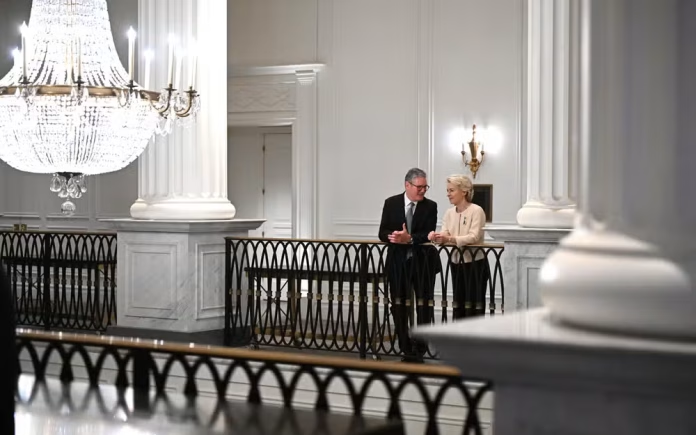British Prime Minister Keir Starmer is set to meet European Commission President Ursula von der Leyen in Brussels on Wednesday. The meeting may prepare the ground for a springtime renegotiation of Britain’s Brexit deal.
The Brussels meeting comes at a time when Home Secretary Yvette Cooper remains strongly opposed to an agreement that would allow young people to move more freely between Europe and Britain because of her desire to cut immigration. The firm rejection of the proposal has cast doubt on London’s interest in strengthening ties with Brussels.
On the other side, the agreement is a measure EU diplomats see as key to starting more serious talks in the spring. The European Union’s ambassador to Britain, Pedro Serrano, recently proposed a relatively narrow youth mobility scheme that would enable young Europeans to more easily spend a sabbatical in the UK, and vice versa.
Anand Menon, director of the UK in a Changing Europe thinktank, said as follows:
The EU is particularly keen on youth mobility, which seems to have turned into a test of good faith. On the Labour side, there’s a political pressure to be seen to be doing something. It’s almost the mirror image of the Tories, because they spent a lot of time talking more extremely about the EU than they were willing to act in practice. With Labour, its members and voters want them to have a closer relationship with the EU, so Labour has to do enough to keep those people happy without actually breaching any of its red lines.
“There’s political pressure to let young people come here. From our point of view, we want to start unlocking some of the kind of small things around the Brexit deal that could make life easier,” Menon added.
The talks this week are seen as setting the stage for an EU-UK summit next spring. Further discussions would take place in the autumn to prepare for a summit between Starmer and the heads of the major EU institutions, von der Leyen and incoming European Council president António Costa.
One senior EU diplomat hailed von der Leyen’s proposed reset of EU-UK relations: “We are missing Great Britain very much on many issues in the council [of EU ministers]. A better relationship is very important, but again what is very important is to remember that it was the UK that quit.”
Still, Downing Street remains opposed to the youth mobility agreement. No hint the Labour Party would consider rejoining the EU customs union or single market – the only measures that might matter in terms of economic growth prospects. But within the Labour Party ranks there is also confusion regarding Starmer’s willingness to take political risks to open up the possibility of a major renegotiation of the Brexit agreement in the spring.
